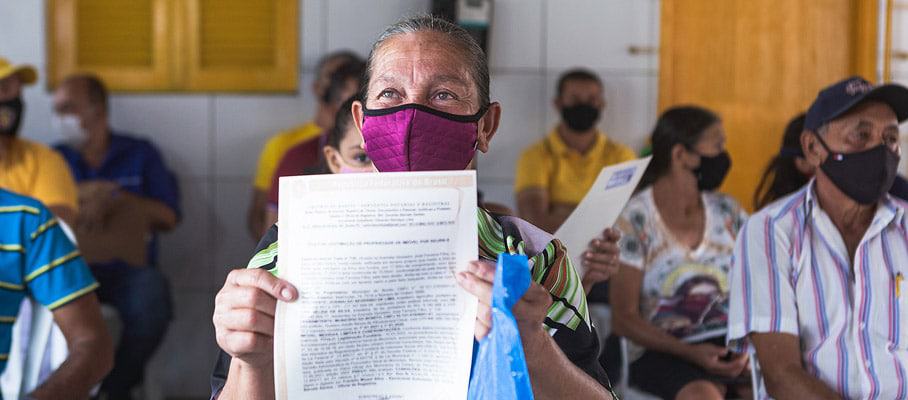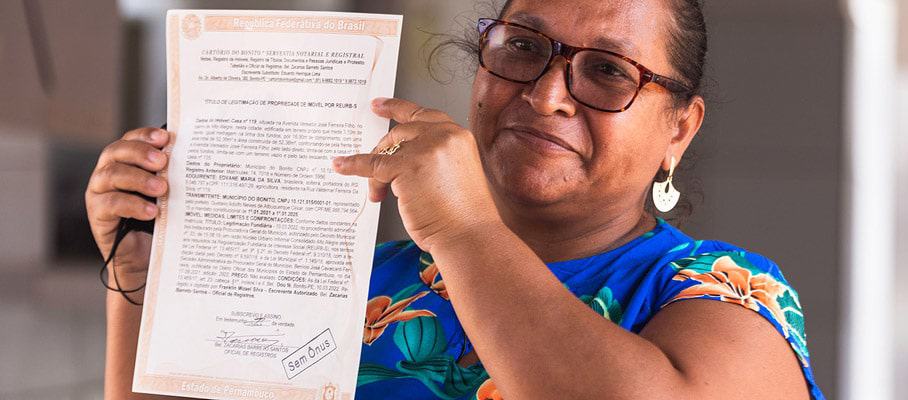Can we transform our cities by addressing the gender insecurity and inadequacy women face? In the northeast state of Pernambuco in Brazil, Espaço Feminista reflects on lessons learned from fighting for women’s land rights by achieving land regularisation in informal settlements.
The Brazilian Housing Deficit is a Gender Deficit
Why does land inequality in Brazil impact women in particular?
In Brazil, 84.72 per cent of the population live in urban areas. Our cities face immense inequalities, for example in terms of who has access to the “formal city”: well-served with basic infrastructure and services. But this is rather the exception, and those living in the informal areas of our cities face multiple problems of housing inadequacy (precarious infrastructure of the house, high density per room, lack of sanitation, high cost of renting).
There is great gender deficit in housing inadequacy, since women represent 60 per cent of those living in inadequate housing conditions. Furthermore, women face problems of land and urbanistic irregularity, meaning the problem is likely underestimated due to problematic question wording regarding the status of the land. In short, inequality is even higher once the informal urban settlements are included.
Official land titles are a direct answer to both land and urbanistic irregularity, since the Brazilian law requires that to holders of titles basic infrastructure is provided. Regularisation of titles are especially important to female residents because they are the ones most vulnerable to poverty, domestic violence, and eviction. Another important issue is the colossal problem of informal spouses, being in informal marriages (civil informal union), or second wives.
Will Land Regularisation in Bonito Redesign the City, Redefine Priorities of Public Policies?
Espaço Feminista is a civil society organisation founded in 2008 to contribute to the empowerment of women from a feminist perspective through the education processes of political formation, as well as through research and intervention in public policies aimed at the full participation of women in political life and the achievement of their human rights. It is dedicated to fighting for urban and rural women’s land rights, gender and racial justice, democracy, and human rights.
In 2018, it partnered with other organisations to perform quantitative research in both urban and rural areas of Bonito. The results indicate despite having lived on the land for decades and even built their own homes, most women had not a single piece of paper to prove that the land belonged to them. Hence, based on the legal provision, two requirements for the land regularisation were signed and presented to the General Attorney of Bonito on behalf of residents of two informal settlements.
In a quick and very positive response, the municipality proposed a law to the city council, which was approved. On 15 August 2019, the mayor of Bonito signed a decree, which laid the path for land regularisation of 15 informal settlements that were built on public land and an estimate of 5,000 dwellers. A relevant detail: the long process of land regularisation required technical and legal capacity that the local municipality did not have. Hence, a formal partnership between the local government Espaço Feminista was announced, as it had the technical capacity and the experience acquired during another process of land regularisation in Ponte do Maduro – Recife, performed in the period of 2010 to 2014.
This was a real victory but also a big challenge for Espaço Feminista. An external alliance was necessary to enable the long process that land regularisation requires, both in equipping the municipality to perform the socio-economic survey and answering to all the legal aspects required, but also and more importantly, working in the regularised areas to inform women about the importance of providing the information and the relevance of such an initiative. There was a strong scepticism among the population due to the innumerable unfilled promises made by previous administrations.
Espaço Feminista ensured support from Wellspring Philanthropic Fund, and additionally gathered the experience of two other international organisations: Landesa, and Global Land Alliance. Finally, a contract was signed with Cadasta Foundation to develop a platform and system to accelerate the process of data collection and create a large database for future analysis.
Beyond Expectations for Women’s Land Rights
On 11 March 2021, the first regularisation was concluded in the area of Mutirão; land titles were handed to 475 beneficiaries in a very enthusiastic, though closed ceremony, in the middle of a pandemic. 69 per cent of land titles were handed to women as the sole beneficiary, or in joint titles regardless of marital status. As feminists fighting for gender justice and women’s land rights, we celebrated!
The best was still to come! Exactly a year later, on 11 March 2022, a moving ceremony was conducted in a public school in the informal settlement Alto Alegre. This time, 50 per cent of the land titles were registered with women as the sole beneficiaries; another 35 per cent were registered as joint titles, where most of these joint titles list the women’s names first. Altogether, 85 per cent of the land titles went to women, granting them the security and dignity they waited for for many decades:
“I live in this house with my six grandchildren. I have built it brick by brick; paying the materials with the Bolsa Família (a federal cash transfer program) that I received.”
Maria Aparecida de Lima – Alto Alegre resident

“A real victory for me and for my entire family – I raise my 6 grandchildren” © Maúna/Juana Carvalho
“It is very important [to receive the land titles] because we cannot afford to pay for rent. Having the opportunity to own my own house, having my name on the title is very good. It is an assurance that it is mine and no one will take it from me. I feel safe. Women’s lives are different, we have more to do—take care of the children, work, take care of the house. It’s hectic! A woman would feel more secure when the property is in her name, and she knows that it will belong to her children [heirs] after her death.”
Edvane Maria da Silva – Alto Alegre resident.

The land title is mine after 38 years of insecurity and constant threats – Alto Alegre, Bonito © Maúna/Juana Carvalho
Lessons Learnt from Ponte do Maduro and Bonito
Looking back to 2014, when Espaço Feminista struggled for four years to ensure land regularisation in Ponte do Maduro, Recife, we can compare two different processes and political contexts.
In Ponte do Maduro, the regularisation policy was performed by an estate company, well equipped with the knowledge that also had control of the process. In that case, we fought for gender equality in a completely different manner, through a very well-organised group of women community leaders. The results were achieved, but we didn’t have access to disaggregated data to evaluate the impacts.
This was a different situation compared to Bonito. Here we had a municipal government with little technical and legal expertise, who accepted to perform land regularisation through a unique partnership with a feminist organisation capable of providing the technical capacity needed. In the case of Bonito, we also had all the disaggregated data necessary to perform a thorough analysis. The databank as well as good quality drone images of all the 15 areas allow us to measure the impacts in three or five years, but also will inform the next areas object to land regularisation. So far, three areas have been dedicated for the next regularisation, including 1,400 residents.
From these experiences, we strongly advocate for policies to be implemented at the local/municipal level, where the population can more directly access policymakers to influence the political agenda, as well as directly benefit from the outcomes.
Over the coming years, the Bonito land regularisation process will continue to contribute evidence to land governance debates, the nuanced aspects around women’s land rights in practice, as well as the impacts it can produce if women constitute the majority of land and householders – both in terms of real change in power relations at different levels and in community management.

